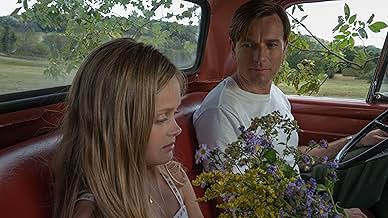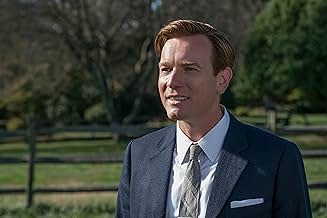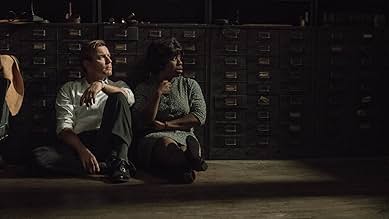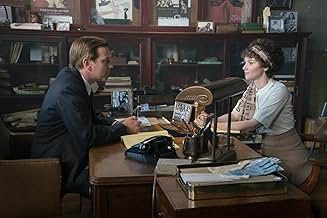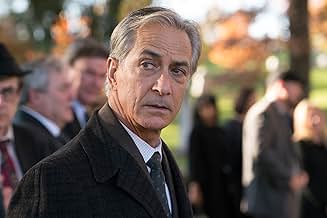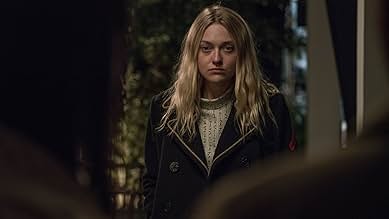An All-American college star and his beauty queen wife watch their seemingly perfect life fall apart as their daughter joins the turmoil of '60s America.An All-American college star and his beauty queen wife watch their seemingly perfect life fall apart as their daughter joins the turmoil of '60s America.An All-American college star and his beauty queen wife watch their seemingly perfect life fall apart as their daughter joins the turmoil of '60s America.
- Awards
- 1 win & 3 nominations total
- Merry (8 Years Old)
- (as Ocean Nalu James)
- Director
- Writers
- All cast & crew
- Production, box office & more at IMDbPro
Featured reviews
Philip Roth's novel
American Pastoral (2016)
The film is based on a novel about a family with a daughter with a speech impediment. She witnesses a traumatic scene of the infamous monk setting himself on fire in television. After this childhood incident Merry (Fanning's character) becomes a radical opponent of war. She starts out vehemently opposing Lyndon Johnson and the war efforts but eventually becomes the culprit in a murder after a bomb goes off. Swede (Ewan McGregor) spends most of the film trying to find his estranged daughter and find out why she is the way she is.
I think the film has strong performances as you would expect from the cast of this caliber. You immediately see the disenchantment of youth in Fanning's character and understand how radical she is in her anti-war stance. Her pained relationship with her mother is stated quite well, and the uncomfortably in it drives her mother mad. I had no problems with the character interactions, however the film cannot escape feeling dull and prolonged. You don't care enough to follow Swede as he tries to find his daughter, and when you finally find her, its just very underwhelming.
Its hard to care for Fanning's character as she's unlikable from the get go. The film doesn't offer much else outside of a quest for a character you'd rather remain lost. The method of storytelling does not always prosper as it goes through periods of stalling and the payoff isn't really entertaining. It gets very lost in an antiwar shuffle and remains shallow despite trying to go deep. I'd say its exciting to see McGregor get behind the camera but his first adaptation does not have enough life.
6/10
'I was never more wrong about anyone in my life.'
Philip Roth's superb book has passages of language that crystallizes our thinking, our memories, our association with life. In this cinematic transformation the words are placed in the utterances by Nathan Zuckerman, sort of an Everyman as he states in the opening of the film – 'Let's remember the energy. America had won the war. The depression was over. Sacrifice was over. The upsurge of life was contagious. We celebrated a moment of collective inebriation that we would never know again. Nothing like it in all the years that followed from our childhood until tonight, the 45th reunion of our high school class 30 or 40, a gathering of my old classmates would have been exactly the kind of thing I'd have kept my nose out of. But at 62, I found myself drawn to it as if in the crowd of half-remembered faces I'd be closer to the mystery at the heart of things, a magic trick that turned time past into time present'. John Romano adapted Roth's novel American PASTORAL for the screen. Ethan McGregor directs. We all reflect on a time that somehow, though placed in the 1960's resistance against the Vietnam War, is terrifyingly familiar with the mood of the nation at present, again at resistance rallies – and that is the reason it works so well.
Seymour 'Swede' Levov (Ewan McGregor) was from the Jewish community and is an All- American sports star in high school. He had everything an American idol can dream of - a the tall muscular young man and high school star athlete but he married a Catholic beauty queen named Dawn (Jennifer Connelly) against his father's (Peter Riegert) advice. Swede later became the successful manager of the glove factory his father had founded, which allowed him to live with his wife in a beautiful house in the New Jersey countryside. Well-mannered, always bright, smiling and positive, conservative but with a liberal edge, what bad could ever happen to him? The couple's stuttering daughter Merry (Hannah Nordberg then Dakota Fanning) is their pride and joy until she steps into the 1960s and becomes an antiwar activist, responsible for bombing a little station, killing the owner in what is a senseless and horrifying change in life direction. Merry leaves home and the rest of the film is a father's search for peace with his distraught wife and community while he ceaselessly searches for his renegade daughter.
A difficult film to watch, just as the book was challenging to read. But somehow the mirror it holds up to society as we are currently living it makes the disturbing experience all the more poignant.
the end of idealism
The story examines the cracks behind the façade of a seemingly perfect family the sports hero marrying the beauty queen. Of course, there is always more going on within a family than most care to admit (at least that was the case in the days prior to Facebook). There's an early scene where Swede has introduced Dawn (Jennifer Connelly) to his father (Peter Riegert), and the philosophical and religious differences perfectly capture the changing times and mores from one generation to the next. Never has this been more true than the late 1960's and early 1970's political and social upheaval were daily occurrences – and sometimes quite violent.
The first half of the movie is exceptionally well done and captures the essence of why the second half feels like a total decimation of everything Swede thought he had. He and Dawn's daughter Merry is beautiful and feisty and stutters something that only enhances the anger she expresses and anguish she causes for her parents. Her innocent questions as a young child evolve into radical political beliefs and affiliations as she grows up.
Merry (ironically named) is by far the most interesting character in the story, but with the focus on Swede, Dakota Fanning only has brief moments that are worthy of her talent, and Dawn has only a few emotional moments that allow Ms. Connelly to flash the acting depth she hasn't shown in years. So much time and attention is devoted to Swede that the second half is a bit of a letdown and leaves too many details and questions unanswered.
John Romano's (The Lincoln Lawyer) adaptation of the American classic took a different direction than we might have preferred, but it's a thankless job since so many have considered this as unfilmable. McGregor shows a good eye as a director, though it's obvious this material needed a more experienced filmmaker at the helm. The great Alexandre Desplat provides a classy score the piano pieces are especially well suited. Supporting work is solid from David Strathairn as narrator Nathan Zuckerman, Rupert Evans as Swede's brother, Molly Parker as Merry's therapist, Uzo Aduba as Swede's employee, and Valorie Curry as a misguided revolutionary. It's a reminder that family dynamics may be the most complex organism, and when blended with the volatile times of the Vietnam War, a generational gap should be expected even if it's difficult and emotional to accept.
The movie is dark, very allegorical and deserves a bigger audience than it will get.
Soundtrack
Did you know
- TriviaPaul Bettany was cast as Swede, Jennifer Connelly as his wife and Evan Rachel Wood as their daughter. All dropped out in 2004, after the movie spent many years in development. After 10 years, Connelly returned in the lead role, alongside Ewan McGregor.
- GoofsThe newspaper's masthead identifies 1970 as it's "141th Year." Should have been "141st Year."
- Quotes
[last lines]
Nathan Zuckerman: [narrating funeral] You come at people with an open mind, and yet you never fail to get them wrong. You get them wrong while you're with them, or you tell someone about them and get them wrong again. That's how we know we're alive. We are wrong. About the Swede, how life was going to open its arms and shower blessings upon him, I was never more wrong about anyone in my life.
- Alternate versionsThere are at least two well-known versions: the theatrical, worldwide edition, with a runtime of 1h 48m (108 min) and one cut for Germany, clocking in at 1h 42m (102 min).
- SoundtracksComes A-Long A-Love
Written by Al Sherman
Performed by Kay Starr
Courtesy of Capitol Records, LLC
under license from Universal Music Enterprises
- How long is American Pastoral?Powered by Alexa
Details
- Release date
- Countries of origin
- Official sites
- Languages
- Also known as
- El fin del sueño americano
- Filming locations
- Production companies
- See more company credits at IMDbPro
Box office
- Gross US & Canada
- $544,098
- Opening weekend US & Canada
- $149,038
- Oct 23, 2016
- Gross worldwide
- $2,063,436
- Runtime
- 1h 48m(108 min)
- Color
- Sound mix
- Aspect ratio
- 2.35 : 1







